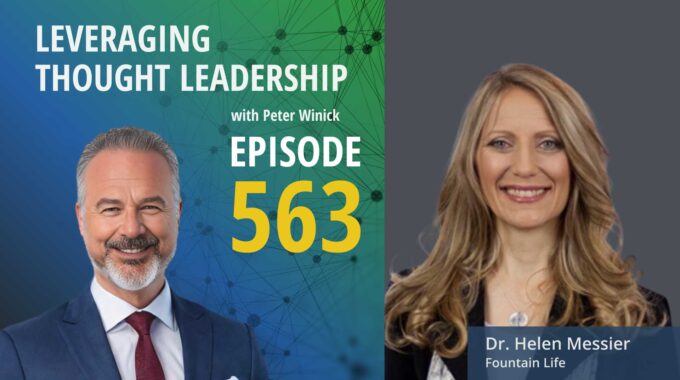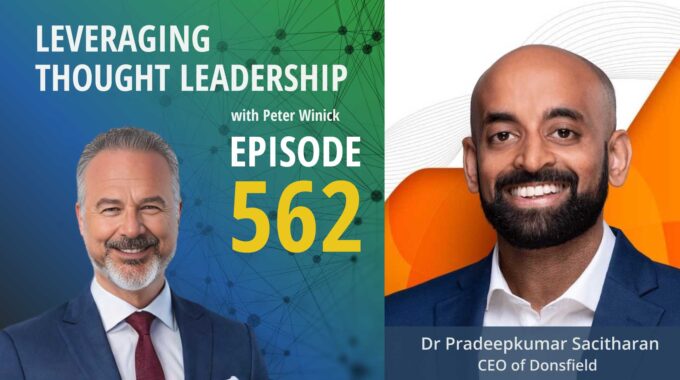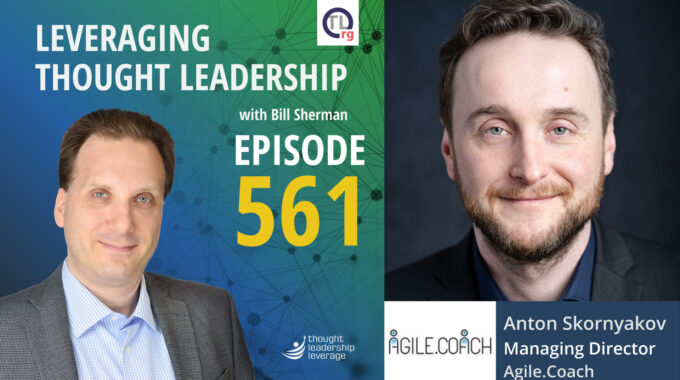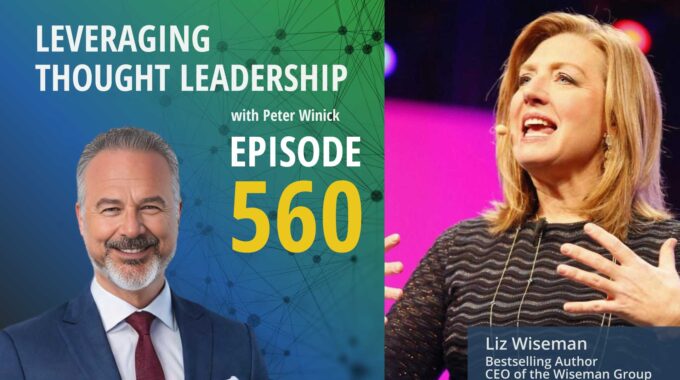Strategies for Shaping the Future of Healthcare A conversation with Dr. Helen Messier about what…
Using Thought Leadership to Promote Ecommerce Solutions | Raj De Datta
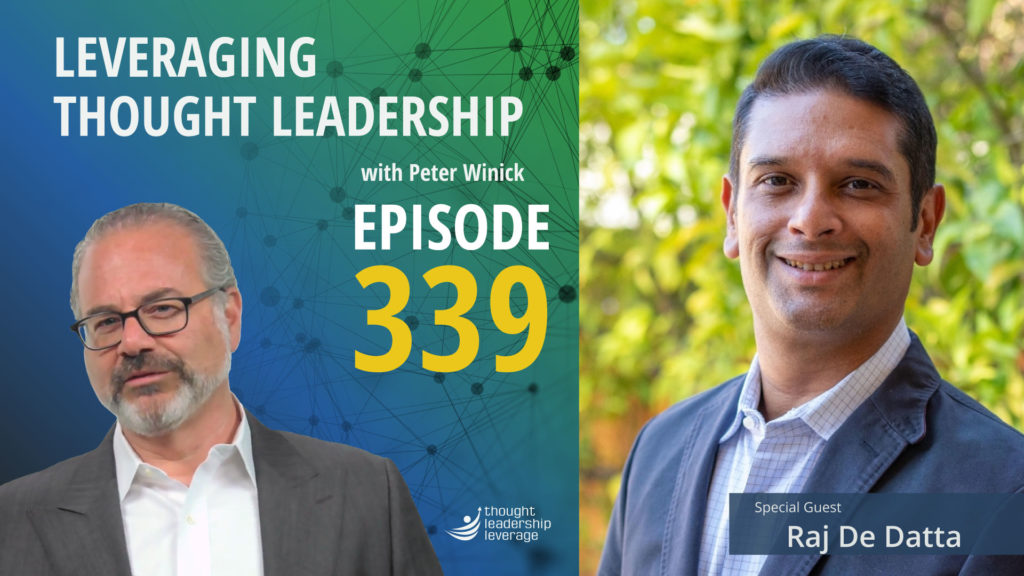
Publishing a book sharing thought leadership on digital success.
An interview with Raj De Datta about authoring a book to increase the profile of his company and his position.
Today’s guest is Raj De Datta, Co-Founder and CEO of Bloomreach, a company bringing solutions that are uniquely built to serve digital commerce and marketing professionals. Their mission is to deliver meaningful moments to customers; moments that result in organizational growth.
Raj shares Bloomreach’s goal to use AI and machine learning for delivering exactly what a customer is seeking. Moment to moment, a customer’s needs change — and so should an organization’s digital response.
With Bloomreach powering roughly 1/4th of e-commerce in the United States and the UK, Raj is often asked “What helps organizations succeed in the digital arena?” In an effort to answer that question, Raj wrote The Digital Seeker: A Guide for Digital Teams to Build Winning Experiences, published by Columbia Business School Publishing. Raj explains that his book is more than a rendition of the typical CEO experience. He discusses the reasons for his research, shares insights, and talks about how organizations can succeed in a digital arena. The academic point of view brings new details to light, and powers a sharper understanding of the fundamentals of success.
Raj shares his hopes for the future of the book, and talks about ways the industry could prosper from these understanding. He’s got a long-term view on measuring success, and the book is a critical part of elevating his position as CEO as well as Bloomreach’s expertise with eCommerce.
Three Key Takeaways:
- Authoring a thought leadership book from the perspective of an academic could open additional publishing options.
- Having your CEO write a Thought Leadership book is a great way to elevate the profile of a company.
- Many Thought Leaders underestimate the difficulty of marketing a book. There are complex nuances in getting it published, and you need to think ahead!
If you need a strategy to bring your thought leadership to market, Thought Leadership Leverage can assist you! Contact us for more information. In addition, we can help you implement marketing, research, and sales. Let us help you so you can devote yourself to what you do best.
Listen to this podcast on Apple Podcast or Google Podcast!
Transcript:
Peter Winick And welcome, welcome welcome is Peter Winick, I’m the founder and CEO of Thought Leadership Leverage, and you’re joining us on the podcast today, which is Leveraging Thought Leadership today. My guest is Raj De Datta. He is the CEO and co-founder of Bloomreach, and he’s got a book coming out from Columbia University Press called The Digital Seeker. He has a vast intellectual engineering with a certificate in public policy and international affairs from Princeton and an MBA with distinction from Harvard. So what I was intrigued by in my calls with Raj is the multiple hats, the author hat and the CEO hat. Sure. So welcome to underachieve underachievers anonymous.
Raj De Datta So it’s great to be with you, Peter.
Peter Winick Thank you. So I want to understand a little bit about Bloomreach and then why with such a full plate, you said, Ah, you know what? I need, I need something else to keep myself busy. Maybe I’ll write a book.
Raj De Datta Yeah, exactly. Well, Bloomreach has been a fantastic journey, really. I started the company now over 10 years ago, and thesis was first to use the best of AI and machine learning technology, which in those days was in its earlier days, and make every website, every app, every experience we all have online. Amazing. By delivering us exactly what we were seeking at that moment. And so, you know, 10 years later, here we are. We’re powering about a quarter of e-commerce in the US, in the UK and board members, CEOs, chief digital officers. They would come to me and they would say, Hey, Roger, you’re powering seven hundred seven fifty of the best brands out there. Tell me what makes the winners win, right? And so I decided to write the book to try to answer that question and really distill between my seed investing and my bloom reach, my boomer work. What really distinguished the winners? And out of that came the digital seeker. It was a fantastic effort to write the book and had a lot of fun writing it and look forward to getting it out there.
Peter Winick Perfect. So Columbia, as a as a publisher, tends to lean more, obviously on the academic side. But you’re practicing CEO and I think you don’t have an academic bent. Sure. Adam, that was there a tension there between the story you wanted to tell and the way they wanted you to tell it?
Raj De Datta You know, interestingly, not. And I think I think the reason was because the average CEO book is a story of Let me tell you how great I am, and I’m going to lay that out for you in my book The Great. Right, exactly. But instead, I really wanted to tell, not my story, but the story of the practitioners in the field and specifically from an academic point of view, why digital winners succeed. And so it’s a little bit like a business school research project in that sense, because I tried to answer that question a bit academically, but really through a thorough investigation of winners and losers and some analysis and the like. And so it fit the mold of a business school.
Peter Winick And you’ve got this interesting vantage point because your customer base is in the middle of this digital revolution and you’re powering it. So given all the work and effort and energy that go into a book, I think the only thing that people underestimate more is a home remodeling project. Right? And those are the things that never get done. You know, sort of the quality of on time on budget. What do you see, if anything has the advantage to bloom? Right. Because as the CEO, there’s lots of things you could be spending your time and effort. I mean, one thing to do an article or a keynote or something like that, but a book is a big deal commitment. What do you see as the benefit of the writer or the impact back to Bloomreach that other CEOs are titled offer?
Raj De Datta Well, look, I think it’s one of those things that’s very hard to put a precise R-Wyo. Sure. Other marketing. But we wanted to be, and we believe we are the leader in e-commerce experiences and there’s just a lot of businesses and practitioners out in the world that have never heard of it. And so we felt we felt like driving awareness was a core corporate goal that we had. We felt like we’re punching above our weight in terms of the impact we’re having on billions of dollars of transactions. And if we get the word out on how to help them grow their business and affiliate Blue Ridge with that in turn would benefit Bloomreach from a software perspective.
Peter Winick Let’s push on that for a bit. So the awareness, I totally get it right. So now we’re competing from a branding perspective. It does a huge job on the awareness. I love the punching above your weight because I’m a firm believer that most thought leadership, if done well, it sort of weight class agnostic, if that’s a thing, right? That’s right. Accenture, or, you know, SAP or whatever, they have the best stuff out there. Smart wins, period. Ultimately, and it might be too early in the journey for you. The next wave, the next sort of level of impact from thought leadership is, you know, client acquisition. Yes. So people calling you going, Hey, I read the book, I saw this or it’s a tie breaker for your salesforce to say, our CEO literally wrote the book on this.
Raj De Datta Right, exactly. And I don’t think we’re at the point where we’re I can tell you today that that has worked, but that certainly is the goal. The book is on preorder now, will be released June 1st. So you can order it already order it on Amazon and other book stores. But it’s not. It’s not out in the wild just yet.
Peter Winick Got it. So some of the things then are ensuring that your customers know about it considering the base. I mean, I would imagine if you did nothing else but market to your customer base on, Hey, would you like 100 copies of the book and we’ll do a webinar for you or something like that for your team, making sure the sales force in the marketing team is playing nicely together and dealing with that. Do you have any thoughts or aspirational goals as to wow as a result of the book? I hope we get invited to that dot dot dot, whether it’s event or articles or, you know, what would wild success look like for you?
Raj De Datta Well, actually, I think to start with wild success would be selling a lot of books because if awareness is your goal and people will read your book, then fundamentally you’re not driving that level of awareness. So I think it starts with actually sales of the book. Not that we’re going to make a business in bookselling, but that it’s a representation of that outcome. But then the second thing is what you said, which is sort of, hey, let’s go survey our customers. Let’s see if they associated us with the space. Let’s see if we can win some deals. Let’s see if my profile on the profile of the company get raised in media, PR and elsewhere. Those are those are the kind of secondary goals that I think I think we see. We’re not. There would be better and faster ways, as you say, to go acquire clients that would cost less money in less time than writing a book. So now we’re in the short term, maybe, maybe not in the long term. Exactly. So in the short term. So as we measure this, we have a long term point of view. So it’s very much about measuring exposure. Here, which we’re set up to do.
Peter Winick Excellent. So what did you what is the delta between what your expectations were going through this process and what it turned out to be? There’s usually there’s a bit of a, I say, rollercoaster, but it’s like it’s a different experience getting a book out onto the shelves or Kindle or whatever the case is. You know,
Raj De Datta I mean, one good thing is I didn’t write this book with like rose tinted glasses about how difficult it is to write a book. I have, you know, several. I’ve had several friends and colleagues write books in the past, and they were able to walk me through the process, whether it was Sal Khan on anatomy or teen, you know, subscribed or nicknamed the customer success. So they told me the pros and the cons, so I walked in with kind of eyes wide open. I think I think the piece that I underestimated actually was not the writing of the book because I knew how hard that would be and not even the marketing of the book, because I’ve been in business long enough to understand that if you don’t invest in marketing and selling, it doesn’t matter. It was actually the publishing of the book that I underestimated. Like, I thought that would be a the writing would take 12 to 14 months. The publishing might take like three months. Then the marketing would go on forever. But the publishing itself was just complex as a process and that just having never written a book before. I don’t think I understood that.
Peter Winick OK, so complex meaning, you know, sort of decision by committee because you have to be aligned with the publisher.
Raj De Datta That’s right. Yeah, I mean, less less. They were. They were great. Columbia’s been great. But, you know, even just the logistics of signing the contract and picking a publisher and then knowing when it’s going to come out and having predictability to that. And then the pandemic changes supply chain. And so having assurances that the book comes out and knowing how many copies the order and what the implication of that is on e-books versus printed books in hardcover and all the nuances of what I just simply didn’t know.
Peter Winick Yeah, no one. And it’s a really complex. There’s so many touchpoints along the way. And then if you’re self-publishing or going hybrid, you have more control. That’s where I’ve read an editorial, etc.. Columbia obviously needs to be protective of their brand as they should, and they’ve got defensive and you’re just one of. I don’t mean this in a bet one of many SKUs for them, right? Which is far more important to you than it is to any publisher.
Raj De Datta And it was, you know, we had it. We had the benefit of choice. And one of the reasons I picked Columbia was because they believed that this book was going to be one of their six or seven most important books for this year and that they were going to promote vs. a much larger publisher which might have, you know, or just had a much larger collection.
Peter Winick But if you’re enjoying this episode of Leveraging Thought Leadership, please make sure to subscribe. If you’d like to help spread the word about our podcast, please leave us a review and share it with your friends. We’re available on Apple Podcasts and on all major listening apps, as well as at Thought Leadership Leverage dot com forward slash podcasts. If it was a year from now, so the book’s been out for some period of time, you’ve been around the block a couple of times on it. What would success look like if touched on a couple of those things? But yeah, is it really that that, you know, bloom reach is mentioned in the same sentence as others? Or give me a sense of sort of. Yeah, so. So it starts
Raj De Datta with who this book is for this book. This book is for digital teens. So what I’m hoping to do with this book is that every digital team has one virtual version of this book in the middle of their table, and they’re using it at all levels, whether they be developers or digital marketers. Little merchandizers all across the digital organization as the manual for how you win in digital. And so I like it on the virtual table of all of those individuals. You know, one
Peter Winick of the standard or a good to great of for digital, for
Raj De Datta digital teams, you know, to go, to go win. And I hope they get a ton of wisdom out of that. And certainly, I hope we get a we get a whole bunch of inbound leads for bloom reach as a result of that. But that would be the secondary goal. The primary goal is that it’s got to add value to their lives as they’re pursuing this highly competitive digital world.
Peter Winick Interesting, interesting. So you mentioned earlier, which I thought was interesting, that you had several friends that had written books and they gave you the good, the bad, the ugly, et cetera, I would imagine that’s incredibly helpful. Right? No question. If you were to have written down, here’s what I expect before talking to your colleagues what was most shocking in terms of what they said to you in terms of what you think?
Raj De Datta I will say what one or one of my friends, an individual named Charles Duhigg. Yeah. I love this stuff. Yeah. So power of habit. So, you know, I was talking to Charles a lot before this book and then he said, Hey, Raj, you know, be really clear exactly to your question what the goals of your book are because, you know, Charles is an author, right? And that’s his job, and that’s what he does for a living. I’m a CEO running my company and I happen to be writing a book, but I’m not trying to be an author in some general sense to make a living.
Peter Winick Well, authors like Bullet Point seven in your world?
Raj De Datta Not exactly like I love. I would love this book to do well. It’s important to me, but you know, I’ll move on to the next thing after, after, after the book is is out there. So, you know, he really made me ask the question, Are you trying to get like a general business book that like power of habit? Yeah, he’s just read by anybody at an airport because it improves personal productivity or something of that type. Are you writing a book for a very specific audience? And if so, and pick and if you’re and if you’re going to do the first, it’s a very different kind of book you’re trying to do. The second, you know, because we’ve been good friends, he could tell me he’s like the first is five times the amount of work, the second, you know, the domain you’re in. So it’s very easy for you to write the book because you’re living it every day and you’re writing about your life experience in the book itself. And we’re very connected to your company and the marketing and so on and so forth. So I deliberately picked the second track, which is write a book for digital about a topic I’ve been working on for 15 plus years in an industry I know really well with lessons that are really clear for often for people I know really well because I work with these types of people every day. And so he was very focused on what you focused on.
Peter Winick I think that’s smart because a lot of people said, Oh, everybody could benefit from this book. So many people can benefit from this book. But that’s, you know, you don’t have the marketing budget for everyone. I think you can probably identify the avatars almost down or maybe even down to the name level at, you know, mid-cap companies, large Typekit, whatever your plan is and say, there’s only seven people a company whose hands we need to get this book into. It’s not.
Raj De Datta Yeah, and it turns out, you know, so we were very clear in our book proposal about this idea of bull’s eyes. So the center of the bullseye was everybody that actually works on digital in every company in the world. And it turns out that’s actually not just seven people because digital has become so front and center. So everything is so you’ve got digital marketers, digital designers, digital developers, digital lawyers, so you’ve got the people in the center of the bull’s eye. Then the people around them are the people that work with those people. So, you know, the next ring of the bull’s eye became, well, who’s the financial advisor working with digital teams? What about the lawyers working with digital character? So you could kind of keep going? But you know, only on the very outer edge is just your average business professional.
Peter Winick Right, and then and then COVID redefined that where digital might have been part of our business versus to many now. Well, I mean, law firms have totally redefined the way they operate social service where they operate.
Raj De Datta That’s right, and that’s why
Peter Winick they would not have considered themselves in the digital business.
Raj De Datta And what was interesting was the demand and interest in this book skyrocketed as the pandemic took hold because everybody said digital is the only thing. And so now demand for how to be graded, it became important to urgent and so we saw the same thing from publishing demand. And just in general, with demand for software from the company, it just sort of has lifted as well.
Peter Winick So one of the things I’d love your take on or might be too early in the process or maybe not is there’s usually at least some, if not a lot lack of alignment between a publisher’s objectives and an author’s objective. So where there’s alignment is everybody wants a book to be successful, right? Everybody wants more units to be sold, et cetera, et cetera. Where publishers get a little bit out of alignment is they tend to think a little bit shorter term three months, six months, nine months, where I would argue that the principles of this book should be looked at from your because putting your CEO hat back on. Well, there’s a capital investment. I can amortize this over five years. Seven. And you might have to do more of the heavy lifting your two or three than the publisher would. And that’s OK if you experience any of that sort of angst.
Raj De Datta You know, I haven’t experienced that yet, but I was also again very clear sighted. Like, I’m not expecting. We’re doing the marketing and of course, right. And we we’ve bought a certain number of books from them. So Columbia is going to be fine at their base cost level. They’re not going to have to worry about whether or not they’re going to make money on this book. They will make money on this book. The question is, will they make a tremendous amount of money or will they make some amount of money, you know, in that world that a lot of a
Peter Winick little or a little over a lot of time,
Raj De Datta that to add that to it and I don’t think we are because we’re driving most of it directly as the book is so connected to my company. We’re also taking more of the burden than many, many authors who are maybe just individual authors have the budget to do. It’s so connected to our mission. We can afford to spend our own marketing dollars against this in ways that maybe a solo practitioner may not. So there’s a little less of lack of alignment that process.
Peter Winick But then that longer term perspective, I think, plays to your benefit as well, right? Both because initially you want it to be successful, measured by number of units year two or three, getting that book in the right hands could be a game changer for you organizationally if that leaves. That’s right. That’s right.
Raj De Datta That’s right. Yeah, no, we’re fired up about it. We think it’s going to move the needle on the business and also help a lot of people do their jobs much better.
Peter Winick That’s fantastic. I appreciate your time, and thanks for sharing your journey with us and good luck with the launch.
Raj De Datta All right. Thanks, Rob. Thanks a lot. Appreciate it.
Peter Winick To learn more about Thought Leadership Leverage, please visit our website at ThoughtLeadershipLeverage.com to reach me directly. Feel free to email me at Peter at ThoughtLeadershipLeverage.com and please subscribe to Leveraging Thought Leadership on iTunes or your favorite podcast app to get your weekly episode automatically.


